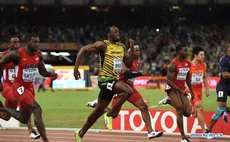Weekes' record stays intact
When Australia's David Warner smashed three consecutive centuries in the first two Tests against New Zealand in the series now going on Down Under it looked as if Sir Everton de Courcy Weekes' record set 67 years ago would be in grave danger. However, things did not continue for the left handed opener in the blaze of glory with which he commenced the series. In the first Test at Brisbane, Warner was intent at ensuring he overcame his weakness of getting to fifty without going on to post three figures. He went on to register the sizeable score of 163 out of Australia's 556 for 4 declared, along the way being involved in a 161 run opening partnership with fellow left hander Joe Burns. His run appetite looking quite insatiable, Warner took advantage of Smith's decision not to enforce the follow on after New Zealand's reply of 317. The young Aussie captain preferred to add quick runs to put New Zealand out of the reckoning and force them to bat last on a wearing pitch.
Warner posted a second century, 116 in the match with his partner, Burns, 129, as Australia went on to win by 208 runs – New Zealand only managing 295 in their second attempt. The stage was set to see whether Warner could continue his century scoring streak on the bouncy pitch at Perth for the 2nd Test where the Kiwis pace attack might pose greater problems. No worry! Warner after a little of a circumspect start, got into fuller stride, notching 253 in Australia's 559 for 9 declared. That put him at three centuries in consecutive Test innings, and the Everton Weekes landmark positively in sight. The question though, could he maintain the break neck pace of heavy scoring at the top of the innings.
This question was in one way answered by the New Zealanders. Tired of the early pounding by their opponents, Brendan McCullum and his men stood firm and resolutely replied to the giant score of 559 for 9 declared with a grinding 624 out of which Taylor made 290 – falling ten short of a triple century. Although Smith held out licence to get quick runs in a bid to enforce victory, Warner fell for 24 driving at Trent Boult when the score read 46 for 2, ending a make hay while the sun shines opportunity.
Let's look back at how Everton Weekes assembled his enduring record of Test centuries in five consecutive innings. He made his debut for West Indies in 1948 on January 23rd, 34 days short of his 23rd birthday on home ground at Kensington Oval, Barbados in the 1st Test against the touring England side. The match ended in a draw as Weekes managed 35 and 25 in the No. 3 position. West Indies 296 and 351 for 9 declared. England 253 and 86 for 4.
The second Test at Port-of-Spain, Trinidad saw Weekes moved up to the opening slot in the second innings, replacing the injured debutant Andy Ganteaume who made 112 in his only Test innings. Weekes' scores in the match were 36 and 20. His third Test against England at Guyana yielded 36 runs batting down the order at No. 7. The match gave West Indies a win by 7 wickets, England 111 and 263, West Indies 297 and 78 for 3. The Everton Weekes cavalcade was yet to begin.
It launched forth at Sabina Park, Jamaica in the fourth Test, Weekes' fourth, the match starting on 27th March 1948, 36 days after his 23rd birthday. England had first use of the wicket and fell cheaply for 227 despite an opening partnership of 129 between Sir Len Hutton and Robertson. Hines Johnson took 5 for 41 and followed this with 5 for 55 in the second innings.
West Indies faltered at 39 for 1 and 62 for 2 but Weekes at No 3 put on 82 with Sir Frank Worrell and went on to score his maiden Test century with 141 in a total of 490 which was enough to guarantee a win by 10 wickets reached with a score of 76 without loss in the second innings.
Seven months later West Indies began their next series, this time against India in India, a place thought to be hazardous on account of the home umpiring and bothersome nature of their crowds. It is said they even used mirrors to dazzle visiting batsmen! That did not prevent West Indies in their 27th Test match, their first in India, from etching 631 on the Delhi pitch. Weekes embraced his 2nd Test century in succession with 128 batting at No 7 after Walcott's 152 (run out), Gomez 101 and later Christiani 107 at No 8, his only Test century, but invaluable in assisting Weekes consolidating his run scoring mission.
India undaunted came up with 454 and in the follow on held out with 220 for 6 in the drawn affair. It was at Bombay for the 2nd Test on 9th December 1948, moved up to No 4, Weekes unloaded 194, caught off the bowling of Mankad. Other sizeable contributions: Allan Rae 104 with Joffrey Stollmeyer 66 as openers, Walcott 68, Christiani 74, Cameron 75. Again India scrambled for a draw with 273 and 333 for 3, Modi 112, Hazare 134 not out and Amarnath 58.
Stage was thus set to see whether Weekes could get an unprecedented 5th Test century in consecutive innings – the scene Eden Gardens, Calcutta 31st December 1948. Remarkably, Weekes obliged with 162 and 101, both times falling caught and bowled by spinner Ghulam Ahmed. Weekes thereby became the only batsman to post centuries in five consecutive Test innings. To crown it all, he was run out for 90 in West Indies 582 which gave West Indies a 1-nil capture of the series at Madras, the victory's foundation laid by Rae 109 and Stollmeyer 160 in a 239 run opening stand. India's reply was 245 and 144.
In the 5th Test Weekes rounded off with 56 and 48 to headline an aggregate of 779 runs with an average of 111.25. He had compiled his phenomenal record by his 7th Test match played when he was no older than 23 in the year 1948.
As a postscript we might add that Weekes is said to have started off in cricket as a groundsman, similar to Nathan Lyon, Australia's off spinner. He was chosen to play for Barbados one month before his 21st birthday against Trinidad at Port-of-Spain where he scored a duck and 8 at No 6 and No 2. Moved up to open in the 2nd match he did better with 53 and 15.
Weekes' 3rd first class match was against Guyana in which he made 56 and 20 not out. He then delivered his first first-class century on 28th September 1946, getting 129 and 45 against Guyana. He was then 21 years old. His high scoring consistency includes 123, 103 and 156 in successive Test innings versus New Zealand in 1956. Sir Everton survives today age 90 not out. No doubt wondering what's wrong with present day West Indians.




